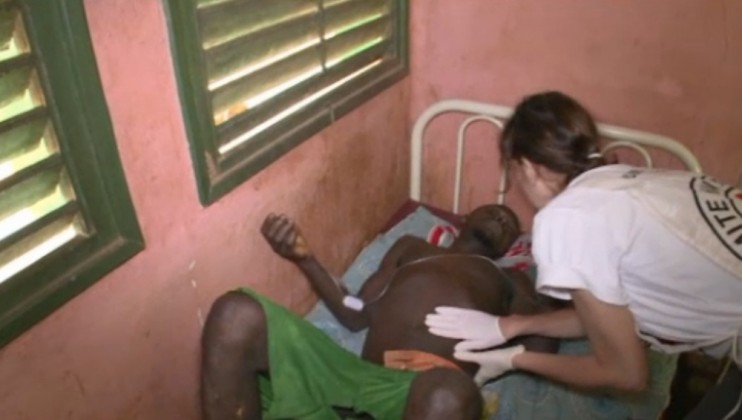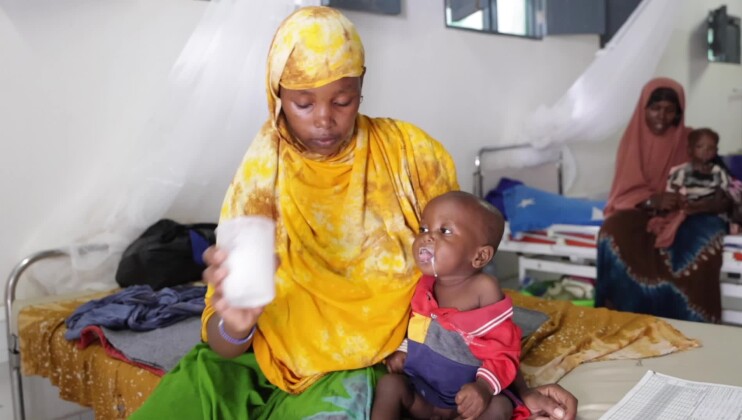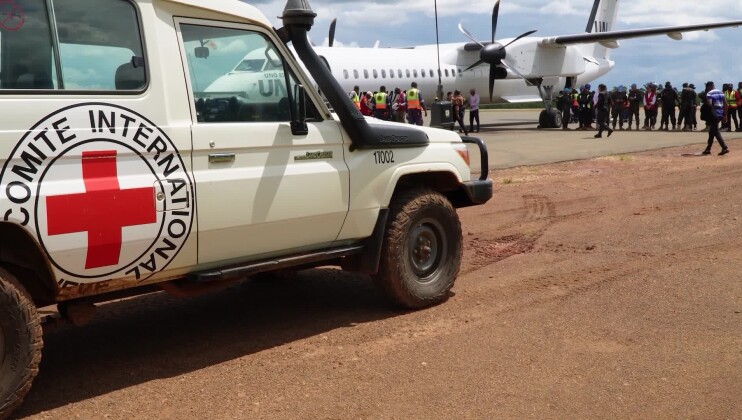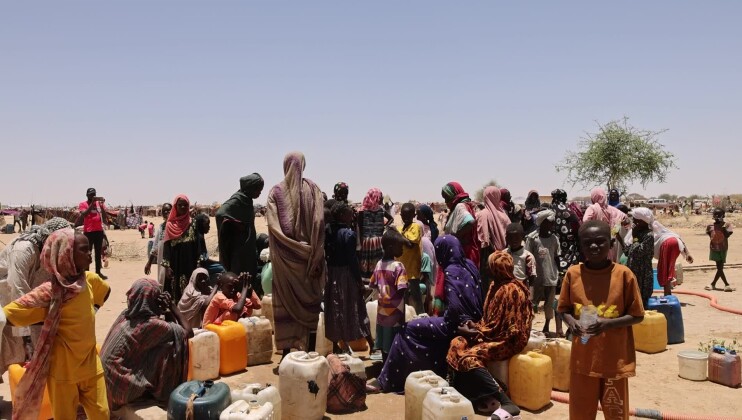ICRC Pres in Central African Republic stresses increasing needs

This is a modal window.
“Every day, the plight of the Central African people gets worse. Their suffering is compounded by repeated acts of violence against civilians, pillaging, killings and sexual violence,” said Peter Maurer, president of the International Committee of the Red Cross (ICRC), following a three-day visit to the country. “With poverty widespread and State institutions crippled by years of instability and crisis, the country’s existing dependence on humanitarian aid will only grow unless efforts are stepped up to restore security.”
In the course of his visit, Mr Maurer met the president of the Central African Republic, government officials and civil society representatives, as well as the president of the Central African Red Cross Society – the ICRC’s main partner in the country. The ICRC president was able to see for himself the situation in the capital Bangui and in Kaga Bandoro and in Ndélé in the north of the country. In Ndélé, tributes were paid to the ICRC staff member killed there on 8 March.
Displaced people and local residents are living in extremely difficult conditions, at the mercy of indiscriminate attacks against men and women of all ages, including very young children. Since December 2013 the violence has been at an unprecedented level, with fighting particularly intense in certain parts of Bangui and in the west of the country. Thousands of people have been wounded or killed, and hundreds of thousands have fled their homes to seek refuge elsewhere in the country or in neighbouring countries, leaving everything behind and enduring extreme hardship. They are completely dependent on humanitarian aid. In M’Poko, where the biggest settlement of displaced people has sprung up near Bangui airport, water is supplied by the ICRC, while other humanitarian organizations provide food and medical care.
The lack of security is hampering efforts to protect people and improve their living conditions. “Everyone in the country is affected by the conflict in one way or another,” said Mr Maurer. “They are entitled to live with dignity and without fear for their lives. The relief efforts and the security of humanitarian workers are themselves being jeopardized by the poor security conditions.”
At Bangui Community Hospital, where three ICRC surgical teams are working round the clock and supporting local medical personnel, around 70% of those receiving emergency care are victims of shootings or stabbings. Unless they are helped to reach the hospital, in particular by the Central African Red Cross or the ICRC, they also have to risk their lives to seek medical care. The wounded must therefore be granted swift and unimpeded access to health care; they are entitled to protection and treatment. Health-care workers and facilities must also be spared and respected.
In other parts of the country, such as the town of Kaga Bandoro, the ICRC supports the region’s referral hospital. Further north, in Ndélé, ICRC staff are almost entirely responsible for keeping the water supply running.
“But more aid is needed,” said Mr Maurer. “That’s why we intend to increase our efforts, particularly in the area of health care, and to expand the geographical scope of our activities.”
The role of humanitarian organizations is also to restore people’s hope and dignity. “Together with volunteers from the Central African Red Cross, we are tailoring our work to the specific needs of people here,” said Mr Maurer. “But without security and functioning State services, humanitarian aid can only achieve so much.”
Shotlist
Location: Central African Republic
Length: 4:57
Format: Mpg4 SD
Production: Didier Revol/Christopher Nicholas
Camera/Editing: Jón Björgvinsson
Sound: French/Sango
ICRC ref: AV170N
Date: 28 March 2014
Shotlist 27.3.2014 ICRC Central Africa Newsreel
Mbaiki and Bangui, Central African Republic, 26th of March 2014
0:00 Two ICRC vehicles on road to the town of Mbaiki, Central African Republic. Woman voice on radio in French: Headquarters, destination Mbaiki, Mbaiki....Over.
0:07 Liana Kakesa, ICRC assistant medical coordinator and Katarina Oberg-Fichtel, ICRC ambulance nurse bring stretcher to patient Aubin Belfino 36 year old gunshot victim with a stomach wound at the district hospital in Mbaiki.
0:16 Patient Aubin Belfino lifted on a stretcher onto ICRC vehicle for evacuation to Bangui, a three hour drive.
0:21 ICRC vehicles on road from Mbaiki to Bangui in the Central African Republic.
0:24 ICRC's ambulance nurse Katarina Oberg-Fichtel nursing gunshot victim Aubin Befio.
0:32 SOUNDBITE Liana Kakesa, ICRC assistant medical coordinator in French:
"We were threatened by armed men who insisted getting on the vehicle to be taken to a destination of their choice. When we tried to explain to them our mission they grew angry and threatened us with machetes and rifles".
0:51 ICRC vehicles drive past Africa Union MISCA soldiers on a vehicle as they enter through the gate of Bangui hospital.
0:58 ICRC medical staff brings gun shot victim to surgery in Bangui hospital, equipped and partially staffed by ICRC medical personnel.
1:00 ICRC surgeons operating Aubin Belfino gunshot victim.
1.11 SOUNDBITE Essam Elsayed, ICRC surgeon in French:
"There were balls that fell even on the hospital grounds. We have received many patients wounded by stray bullets. These bullets also puts the surgical staff at risk".
1:22 MISCA ambulance arrives with a victim, seriously injured by a grenade.
1:25 Wounded man brought into Bangui Hospital.
1:30 ICRC surgeon Essam Elsayed examines wounded man.
1:36 ICRC president Peter Maurer visiting Bangui hospital.
1:46 ICRC president Peter Maurer in the surgical ward of Bangui hospital.
1:54 ICRC president Peter Maurer talking to two patients at Bangui hospital.
Kaga Bandoro, Central African Republic, 27th of March 2014
1:56 Displaced and wounded woman Mariame Sambia, struggling to move as she enters her temporary shelter in the Mabeya neighborhood of the town of Kaga Bandoro in northern Central African Republic.
2:16 SOUNDBITE: Mariame Sambia who fled from the Socada neighborhood in Kaga-Bandoro in Sango:
"My neighborhood was looted. Our doors were broken down, beds were stolen, our kitchen utensils, even the small livestock we have, porks and chicken. All was taken. Some houses were burnt down."
2:30 An armed Seleca soldier outside a Seleca camp in Kaga Bandoro.
2:33 ICRC President Peter Maurer and his delegation meeting with Seleca commander and his soldiers.
Ndélé, Central African Republic, 27th of March 2014
2:44 Boys playing with a bicycle in Ndélé.
2:33 Boy fetching water from an ICRC well in Ndélé.
2:59 Boy bringing water into his house.
3:04 Young smiling woman holding an infant in the town of Ndélé, Central African Republic.
3:13 SOUNDBITE Peter Maurer, ICRC president in French:
"Here in the Central African Republic, we are dealing with a unique conflict situation. There is a long term poverty, the violence of an armed conflict, the violence of an ever toughening criminality and limited state structure that does not provide the population with security".
3:37 "Under these circumstances the humanitarian needs increase day by day. The ICRC is trying to respond to this with important involvement in medical treatment, mobile clinics and support for the hospitals, with surgical teams helping the population, especially those injured in the fighting.
4:06 "We are also heavily involved in the field of water and sanitation. More and more people are struggling to meet their vital water needs. And we support the population with nutrition for their survival".
4:24 "As the number of displaced within the country is increasing, they loose their traditional livelihood which increases their humanitarian need, so we need to come to the rescue".
4:39 "We are trying and hoping to be able to considerably widen our operation in the Central Africa. It is needed, the needs are increasing and the ICRC involvement ever more necessary".
4:57 END



